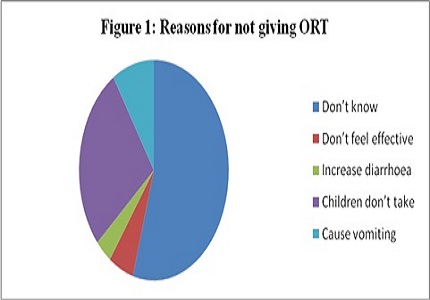Knowledge attitude and practices of childhood diarrhea and ORS administration in diarrhea amongst mothers of children below age 5 years: A hospital based cross-sectional survey
Abstract
Introduction: Basic minimal information about care of children in diarrhea and ORS use is necessary for early recovery. To plan anti diarrheal program, its important to know the knowledge, beliefs, practices of diarrhea understanding and management including ORS; in community.
Methods: A crosssectional survey of 300 serial mothers of under five children presenting to a hospital were enrolled and data regarding awareness of loose motion definition; ORS use, diet in diarrhea and beliefs and practices was collected by using a prevalidated questionnaire.
Results: Most (74.59%} mothers were in age group of 20-30 year old home makers. Only 31.97% wereaware of diarrhea leading to dehydration. Teething was considered a prime cause of diarrhea by 32.64% mothers. Rice based food was preferred in diarrheas by only 45.96% mothers. Only 35.26% knew that extra fluids are needed in diarrheas. Sixty six percent mothers had knowledge of home based ORS but only 22% knew correctly. ORS dose was not known to 89.5% of mothers.
Conclusion: There is a serious need for modifying diarrhea control programs with community education.Incomplete information is likely to cause complications and delay in recovery.
Downloads
References
2. World Health Organisation, Surveillance and Control of acute diarrhoeal disease. ERO reports Ser. No. 44, Copenhagen, 1981.
3. Moy RJ, de C MT, Choto RG, McNeish AS, Booth IW. Diarrhoea and growth faltering in rural Zimbabwe.European journal of clinical nutrition. 1994 Nov;48(11):810-21. [PubMed]
4. Patwari AK. Dietary management of diarrhoeal disease. Chap 12. [PubMed]
5. Patwari AK. Diarrhea and malnutrition interaction: Recent advances in paediatrics. Splvol 6 Chapt 11.
6. Yoon PW, Black RE, Moulton LH, Becker S.The effect of malnutrition on the risk of diarrheal and respiratory mortality in children< 2 y of age in Cebu, Philippines.The American journal of clinical nutrition. 1997 Apr 1;65(4):1070-7. [PubMed]
7. Datta V, John R, Singh VP, Chaturvedi P. Maternal knowledge, attitude and practices towards diarrhea and oral rehydration therapy in rural Maharashtra. The Indian Journal of Pediatrics. 2001 Nov 1;68(11):1035-7. [PubMed]
8. Bella H, Hussein AF, El-Mousan M, Danso KT, Sohaibani M, Khazindar MS. Knowledge, Attitudes and Practices related to Diarrhoea in Eastern Province, Saudi Arabia. Journal of family & community medicine. 1994 Jan; 1(1):40-4.
9. Taha AZ. Assessment of mother's knowledge and practice in use of oral rehydration solution for diarrhea in rural Bangladesh. Saudi medical journal. 2002;23(8):904-8. [PubMed]
10. Ahmed IS, Eltom AR, Karrar ZA, Gibril AR. Knowledge, attitudes and practices of mothers regarding diarrhoea among children in a Sudanese rural community. East African medical journal. 1994 Nov;71(11):716-9.
11. Khalili M, Mirshahi M, Zarghami A, Rajabnia M, Farahmand F. Maternal Knowledge and Practice Regarding Childhood Diarrhea and Diet in Zahedan, Iran. Health Scope. 2013 May;2(1):19-24.
12. Kapoor P, Rajput VJ. Maternal knowledge, attitudes and practice in diarrhea. Indian Pediatr. 1993;30(1):85-8. [PubMed]
13. Gupta A, Sarker G, Rout AJ, Mondal T, Pal R. Risk correlates of diarrhea in children under 5 years of age in slums of Bankura, West Bengal. Journal of global infectious diseases. 2015 Jan;7(1):23. [PubMed]
14. Jha N, Singh R, Baral D. Knowledge, attitude and practices of mothers regarding home management of acute diarrhoea in Sunsari, Nepal. Nepal Medical College journal: NMCJ. 2006 Mar;8(1):27-30. [PubMed]
15. Khan MU. Interruption of shigellosis by hand washing.Transactions of the Royal Society of Tropical Medicine and Hygiene. 1982 Jan 1;76(2):164-8. [PubMed]

Copyright (c) 2016 Author (s). Published by Siddharth Health Research and Social Welfare Society

This work is licensed under a Creative Commons Attribution 4.0 International License.


 OAI - Open Archives Initiative
OAI - Open Archives Initiative


